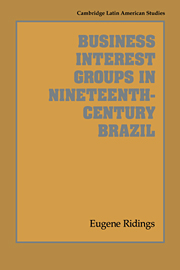Book contents
- Frontmatter
- Contents
- Acknowledgments
- Abbreviations and Usage
- Value of the Mil-reis against the Dollar and the Pound
- Brazil, with cities
- Introduction
- 1 The Genesis of Brazilian Business Interest Groups
- 2 Leadership and Organization
- 3 Influence, Ideology, and Public Relations
- 4 The Export Economy: Agricultural Quality, Markets, and Profits
- 5 The Export Economy: Banking, Credit, and Currency
- 6 The Export Economy: Manpower
- 7 Taxation
- 8 Industrialization
- 9 Communications: Regionalism Perpetuated
- 10 Port Areas and Harbors: Efficiency and Rivalry
- 11 Business Interest Groups and Economic and Urban Integration
- 12 Business interest groups and the Republic
- 13 Conclusion
- Bibliography
- Index
12 - Business interest groups and the Republic
Published online by Cambridge University Press: 27 October 2009
- Frontmatter
- Contents
- Acknowledgments
- Abbreviations and Usage
- Value of the Mil-reis against the Dollar and the Pound
- Brazil, with cities
- Introduction
- 1 The Genesis of Brazilian Business Interest Groups
- 2 Leadership and Organization
- 3 Influence, Ideology, and Public Relations
- 4 The Export Economy: Agricultural Quality, Markets, and Profits
- 5 The Export Economy: Banking, Credit, and Currency
- 6 The Export Economy: Manpower
- 7 Taxation
- 8 Industrialization
- 9 Communications: Regionalism Perpetuated
- 10 Port Areas and Harbors: Efficiency and Rivalry
- 11 Business Interest Groups and Economic and Urban Integration
- 12 Business interest groups and the Republic
- 13 Conclusion
- Bibliography
- Index
Summary
The coming of the Republic brought major changes in the status and policies of business interest groups and eventually a change in the direction of the nation's economic development. The groups found themselves forced or encouraged to engage in partisan politics more emphatically and openly than before. Several of the older associations found their influence seriously weakened, while others found an opportunity to increase their power. The Center for Coffee Agriculture and Commerce, the Center for Sugar Industry and Commerce, and the Agricultural Industrial Center of Pelotas became inactive during the early years of the Republic, leaving the Commercial Agricultural Association of Pernambuco as Brazil's only factor group and the Engineering Club as its sole industrial group.
The Republic, particularly under its military presidents, expressed to a degree nationalist resentment of foreign domination of the Brazilian economy. This resentment had been fed during the 1880s by disputes between factors and exporters over rubber prices and by the attacks of industrial groups on the export-import economy and those who guided it. Nationalism aside, most business interest groups found the transition to the Republic perturbing. All, save the Engineering Club, were disturbed by the threat to the traditional export-import economy posed by Republican tariff policies. Also with the Republic came revolutionary disorder and civil strife for the first time since the 1840s. The Encilhamento brought chronic exchange depreciation and inflation, which contributed to unrest. The political and economic equilibrium of the late Empire had been broken and the response of business interest groups was greater involvement in partisan politics.
During the Empire all business interest groups had openly displayed their adherence to the monarchy and loyalty to the Emperor.
- Type
- Chapter
- Information
- Business Interest Groups in Nineteenth-Century Brazil , pp. 311 - 328Publisher: Cambridge University PressPrint publication year: 1994

